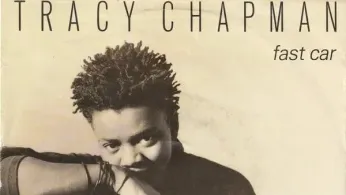
4 hours ago
Why Lesbian Anthem “Fast Car” Is the Gold Standard for Audio Testing - Tracy Chapman's Song is "Sonically Perfect"
READ TIME: 3 MIN.
In the crowded world of audio equipment reviews and speaker shootouts, finding a single song that can reliably reveal the strengths—and weaknesses—of any sound system is a challenge even seasoned experts struggle with. Yet Brent Butterworth, a respected senior writer specializing in audio products at Wirecutter, has made a compelling case for Tracy Chapman’s 1988 hit “Fast Car” as the ultimate test track. Speaking on an April 2025 episode of The Wirecutter Show, Butterworth explained that “Fast Car” is not simply a personal favorite or an industry tradition, but a choice supported by objective measurement and scientific consensus among audio professionals .
Butterworth’s endorsement is grounded in a blend of empirical testing and widespread industry agreement. “Tracy Chapman, Fast Car is generally regarded by audio scientists who have proven this in testing as the best song for evaluating audio equipment,” Butterworth explained during the podcast . The song’s arrangement is notable for its full frequency range: from the crisp, delicate highs of Chapman’s acoustic guitar and vocals, to the deep, resonant lows of the bass and subtle percussion. This dynamic range enables listeners to assess how well a speaker reproduces both the quietest details and the most powerful moments—critical factors for anyone seeking true-to-life sound .
Butterworth’s position is not unique to Wirecutter. Audio scientists and engineers have repeatedly cited “Fast Car” as a gold standard for evaluating speakers and headphones. According to a 2024 special report, engineers value the song’s “haunting, spacious production and tonal balance,” which can quickly expose coloration, distortion, or muddiness in audio equipment .
The implications of Butterworth’s findings stretch beyond the world of professional testing. For consumers upgrading their home audio setups, “Fast Car” offers a practical, accessible way to compare speakers, whether shopping for a Bluetooth unit under $50 or investing in a high-end stereo system .
Butterworth explained that Wirecutter’s evaluations rely on both objective measurements and subjective listening panels, with “Fast Car” frequently used to reveal subtle differences that numbers alone cannot capture. “We get in as many products as we can, we give them a listen and weed out the ones that we know people aren’t going to like,” Butterworth said, noting that the song’s clarity and emotional resonance help ensure only the best-performing speakers make the final cut .
This approach has influenced how everyday listeners judge audio quality. Social media discussions on platforms like Threads and Reddit frequently reference Butterworth’s endorsement, with users sharing their own experiences of discovering previously unnoticed details in “Fast Car” when played through high-quality equipment .
Tracy Chapman’s “Fast Car” has long been celebrated for its poignant storytelling and quiet, powerful delivery. The song’s enduring popularity across generations and communities—including LGBTQ+ listeners—has contributed to its status as a musical touchstone. Many in the LGBTQ+ community have embraced “Fast Car” as an anthem of resilience and longing, finding echoes of their own journeys in its lyrics about hope, escape, and searching for a better life.
Butterworth’s framing of “Fast Car” as a sonic benchmark adds another dimension to its legacy. By highlighting the song’s technical excellence and emotional impact, he invites a broader audience—including LGBTQ+ music lovers and creators—to appreciate how sound quality can deepen the connection between artist and listener. This inclusive approach aligns with the growing recognition that high-fidelity audio should be accessible and meaningful for everyone, regardless of background or identity.
Butterworth’s analysis also sparks important conversations around access and representation in the audio industry. As more diverse voices—including LGBTQ+ musicians, engineers, and critics—shape the future of music and technology, the criteria for “perfect” sound may continue to evolve. Songs like “Fast Car,” which resonate across cultural and generational lines, help bridge gaps and foster a shared language for evaluating what truly matters in audio reproduction.
Wirecutter has made efforts to amplify underrepresented perspectives in its coverage, inviting a wider range of listeners to participate in testing panels and seeking input on products that serve varied needs and preferences . This commitment is reflected in the podcast’s recommendations for affordable, high-quality options that make great sound accessible without requiring specialized knowledge or prohibitively expensive gear.
Butterworth’s championing of “Fast Car” as the definitive audio test track has sparked renewed interest in both the science and art of listening. For audiophiles and casual music fans alike, the song offers a practical tool for judging equipment and a reminder of music’s power to unite and inspire. As the audio world continues to diversify and democratize, “Fast Car” stands as a fitting symbol of both technical excellence and inclusive storytelling—ensuring its legacy will endure in listening rooms, living rooms, and hearts for years to come.






